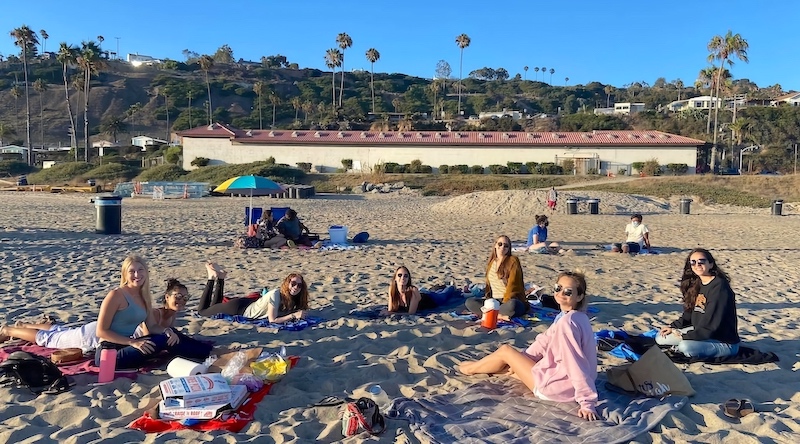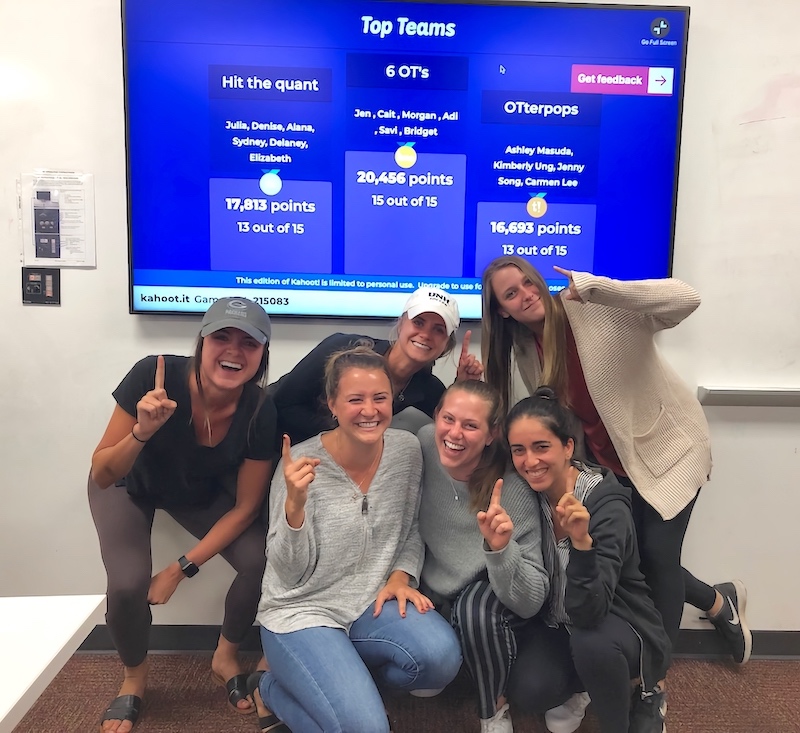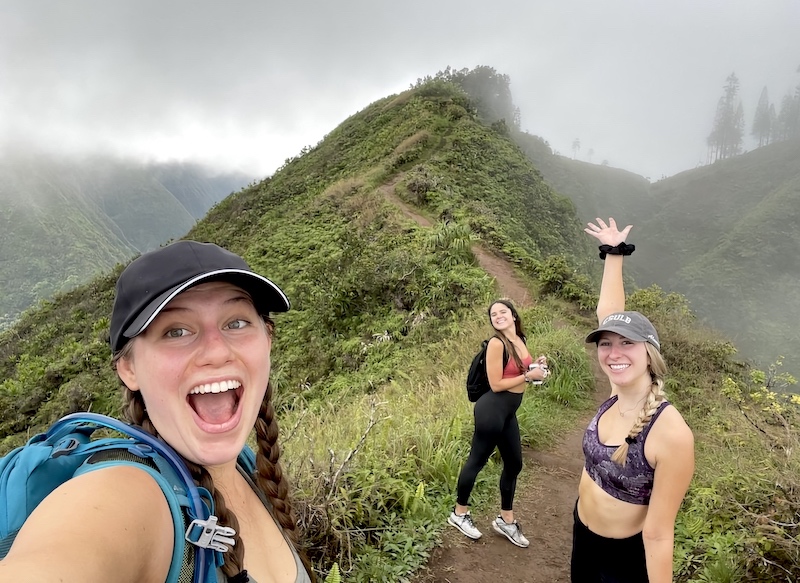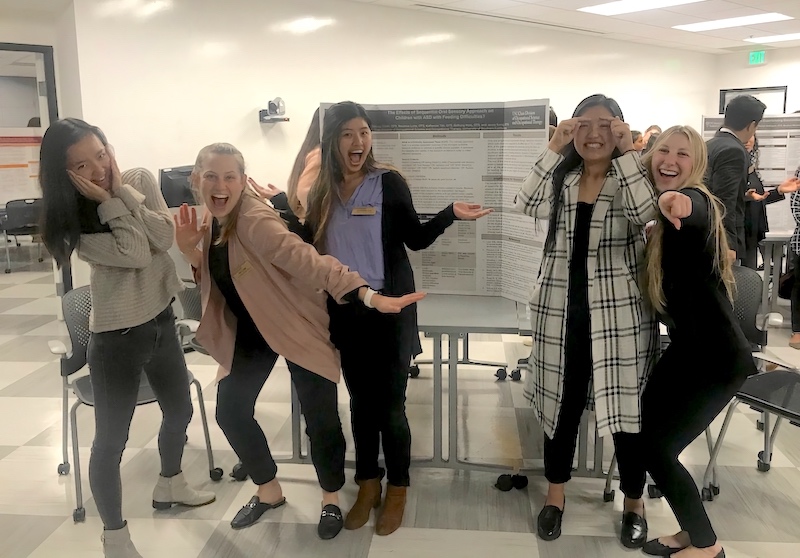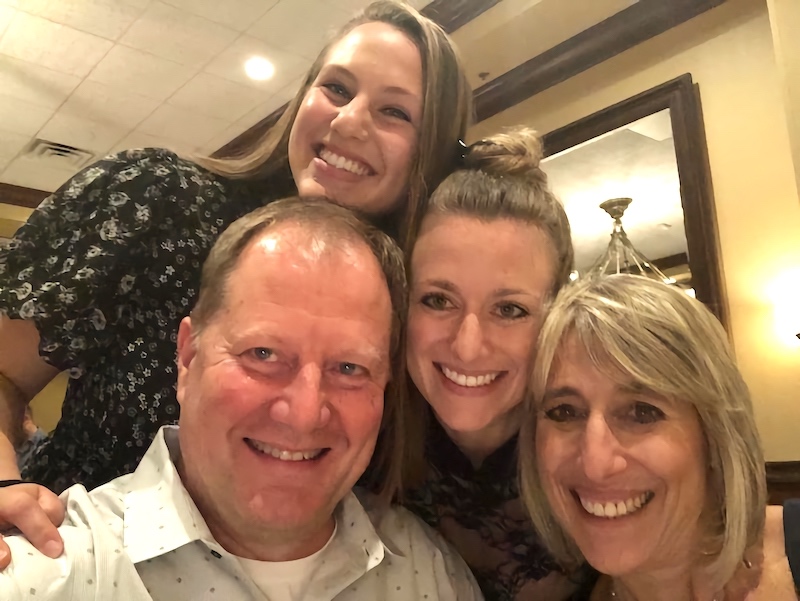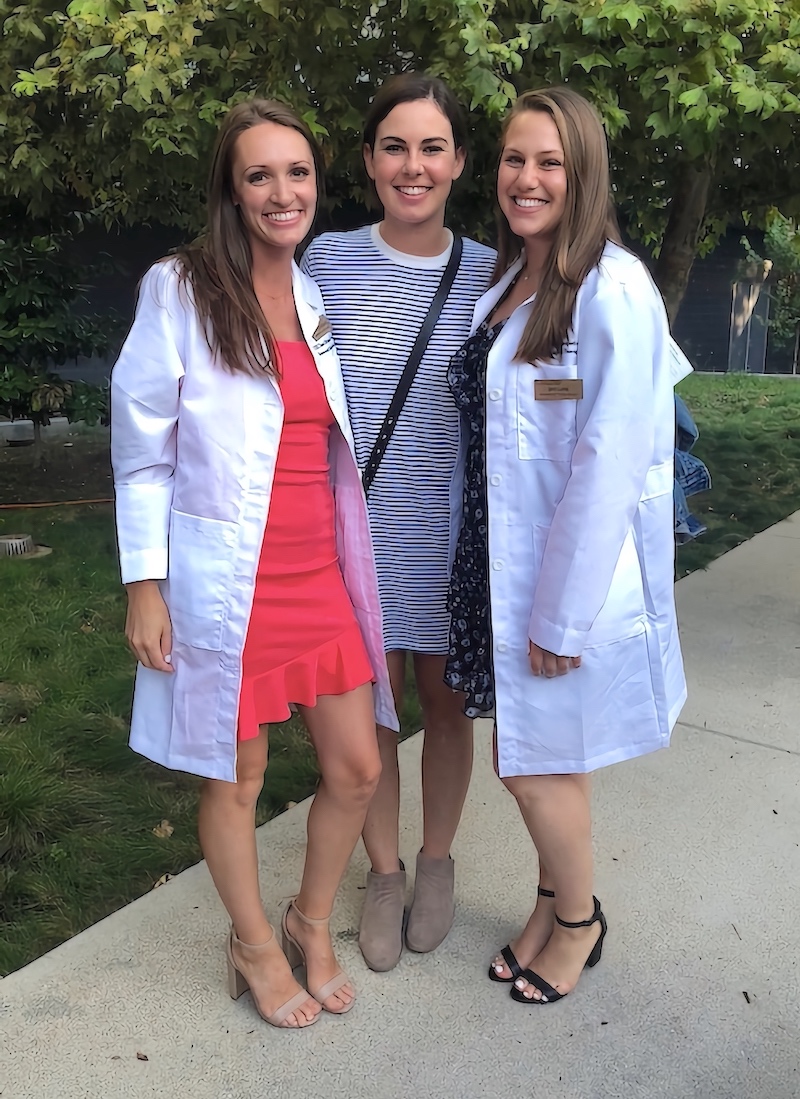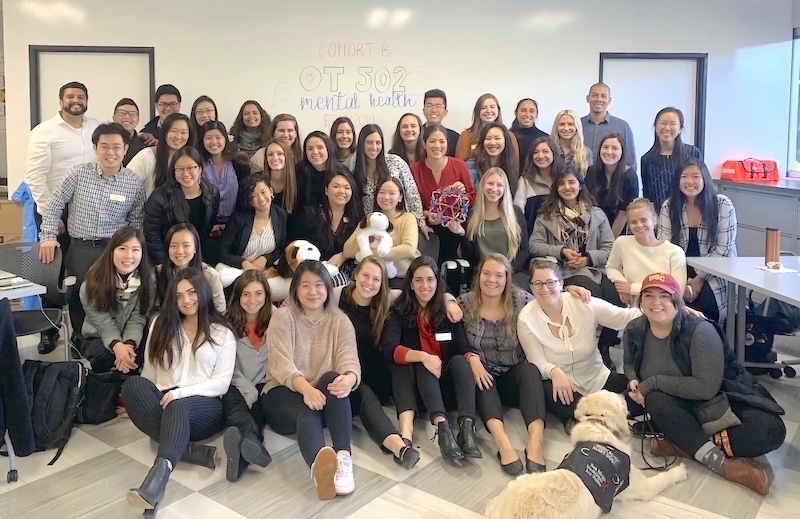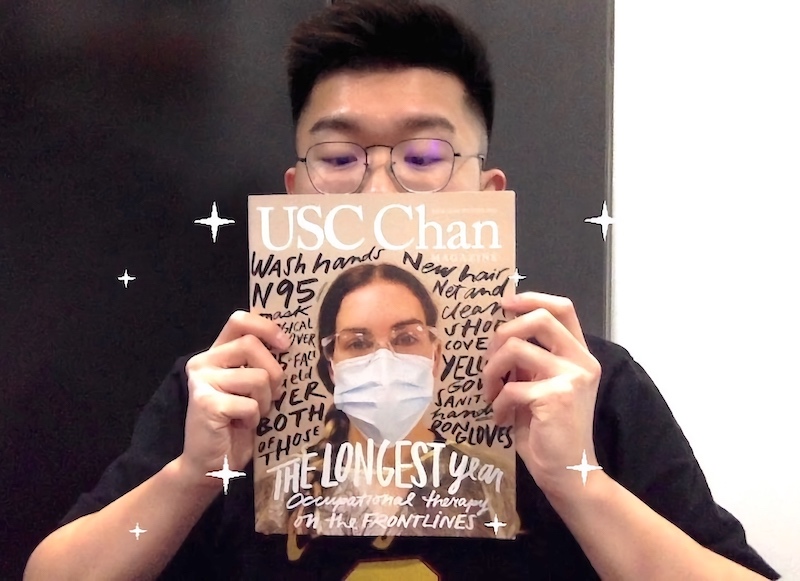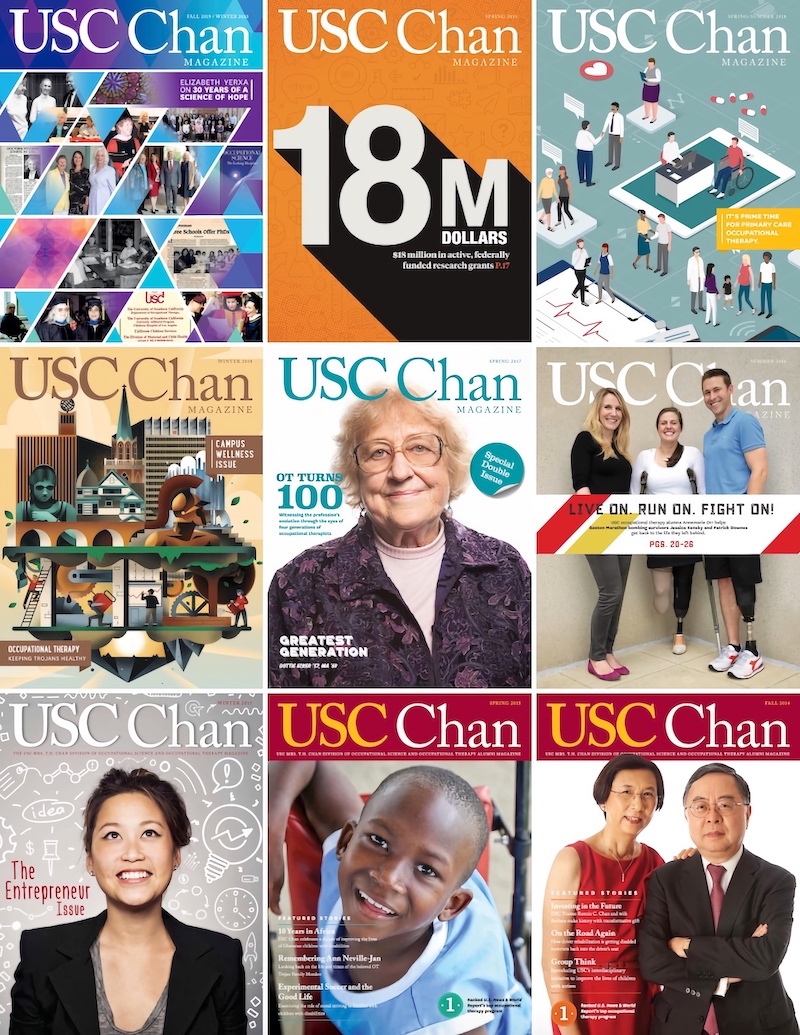Student Blog
Getting Involved
Vivir Con Diabetes ⟩
May 25, 2021, by Global Initiatives Team
Diversity Fieldwork Getting Involved
By Stephanie Gomez-Rubalcava and Liz Rivera
Professional Master’s students
Vivir Con Diabetes (in English: “Living With Diabetes”) is a community service project that we have been hosting as a part of the Albert Schweitzer Fellowship. This fellowship requires students to collaborate with a community site and create a project that caters to the needs of an underserved population. Our project was tailored to service individuals in the local, Spanish-speaking community of Boyle Heights who have been diagnosed with prediabetes or Type II diabetes. We believe that there is an increased need for healthcare providers who can implement culturally-sensitive interventions.
This program was started in 2018 by an occupational therapy student in the Chan Division, David Saldana. It was then continued the following year by Daniel Padilla Vega and Cecilia Garcia. We began as volunteers for the program in 2019 and were awarded the Schweitzer Fellowship in 2020. With USC OT students receiving this fellowship for the third year, it provided us the opportunity to continue expanding this amazing work. Our sessions covered topics related to lifestyle modifications to improve diabetes management such as: stress management, mental health, sleep hygiene, and increasing understanding of what it means to be diagnosed with diabetes. We really wanted to focus on prevention for those diagnosed with prediabetes and on modifying the habits and routines of those diagnosed with diabetes. In previous years, these sessions were hosted in person at our project site, the LAC+USC Wellness Center, but due to the global pandemic, we had to host the sessions virtually.
Although over the last year we faced several challenges in delivering the diabetes management content via Zoom, there were some great benefits to conducting this program virtually. Some of the challenges included making the program accessible for our target population, participant difficulties navigating Zoom, and internet connectivity issues. The silver lining to all of these challenges was that over the weeks, we created a family-like, virtual community and provided participants with space to reflect on their health goals. Many of them mentioned that our Saturday sessions were the only time they dedicated to themselves, and so we decided to incorporate at least 10 minutes of mindfulness/yoga activities to each session. We also provided every participant with at least one free, at-home hemoglobin A1c test to screen for diabetes.
Although a couple of weeks ago we celebrated our final Vivir Con Diabetes session, we are truly grateful for the opportunity to learn with and from our participants. As soon-to-be Latina graduates of occupational therapy, we are excited to continue working with our Latinx community in our future careers and helping them bring about positive and meaningful change in their lives. Lastly, Stephanie Perez, a previous volunteer of Vivir Con Diabetes, has recently been awarded a 2021-2022 Albert Schweitzer Fellowship (see contact information below). We are excited for her to bring innovative ideas to the program, and we encourage current or incoming students to contact her for an opportunity to volunteer with her project during the Fall and Spring semesters. Thank you to our mentor Dr. Jesus Diaz, Daniel, Cecilia, and all of our 2020-2021 student volunteers for making this program possible. Fight on Trojans!
Stephanie Perez, OTS: .(JavaScript must be enabled to view this email address)
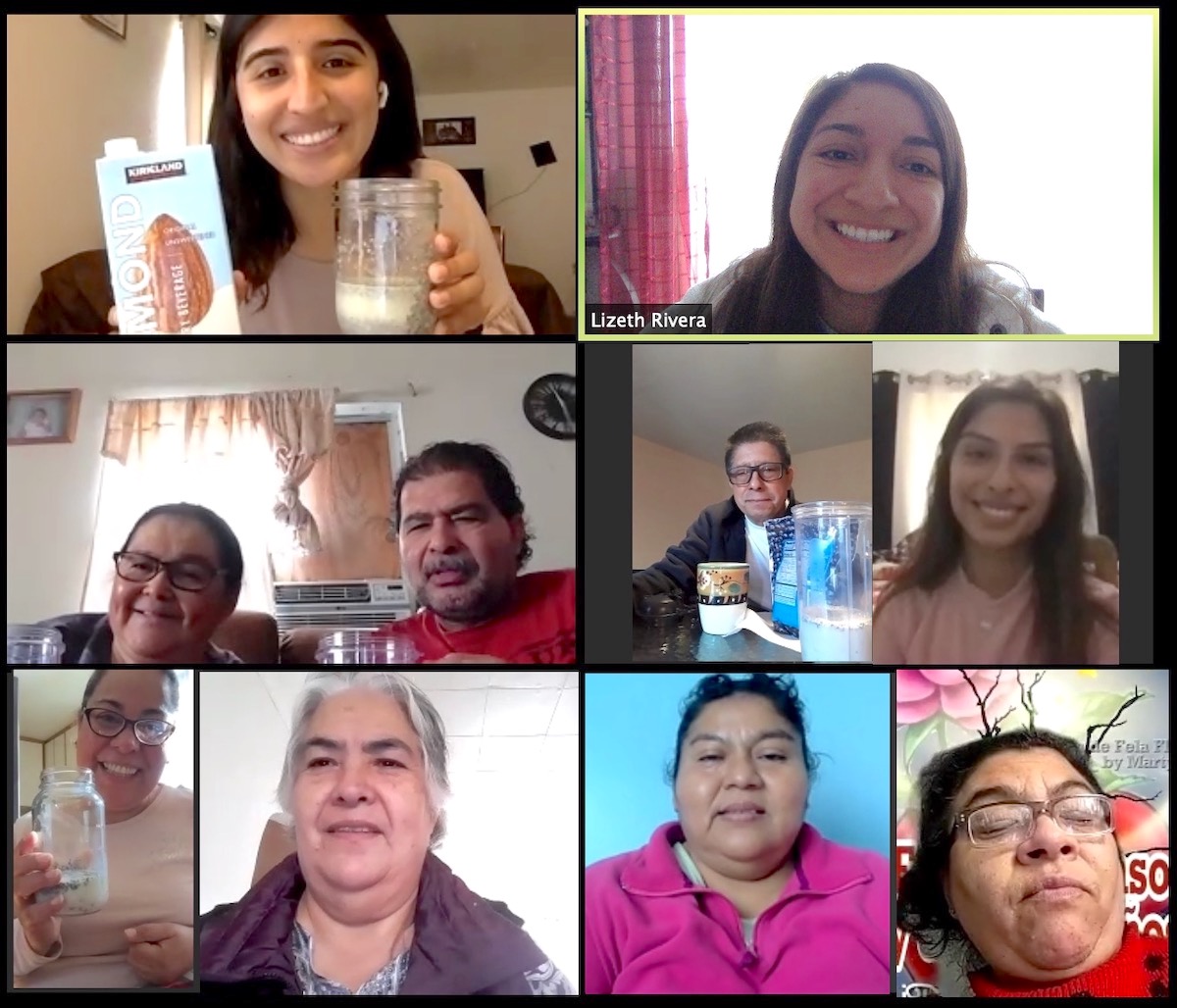
A photo from one of our nutrition/healthy eating sessions. We prepared overnight oats with some of the participants via Zoom.
⋯

Thnks fr the Mmrs (aka. Thanks for the Memories) ⟩
May 13, 2021, by Savi
Getting Involved
Coming into this program, I had no idea what to expect. I didn’t know if I truly had what it took to succeed and I thought that I would be lucky to just make it through to graduation. Little did I know that I would embark on a very unique and enlightening journey of being an ambassador for the Chan division.
I was lucky enough to be chosen as one of seven representatives for our division and I truly could not be more thankful. I have had the most incredible opportunity to organize and speak at over 20 events, correspond with and get to know over 40 prospective and incoming students, and write around 20 blogs for incoming, current, and prospective students to read for years to come. I am grateful to have had the opportunity to share my passion for OT and our program with hundreds of people around the world, and I am incredibly thankful for my OUTSTANDING ambassador team and admissions team for all of their support and for everything they have taught me. It truly has been an honor working with and learning from all of you. This job has brought me so much joy and although I am so sad it is coming to an end, I am extremely excited to see all the amazing things the incoming ambassador team will do throughout the next year.
I have made wonderful friends and connections and have learned extremely valuable skills that I will carry with me for the rest of my career. I have been inspired by those around me (read my blog about all these wonderful people) and have gained invaluable leadership skills through both this ambassador position and my coursework.
Reflecting on these two years I realized that time really does fly by . . . and that I am definitely not ready to leave the Chan family just yet! I will, therefore, be staying another year at USC to pursue the advanced clinical track of occupational therapy doctorate, completing my residency at California Rehabilitation Institute and Cedars-Sinai. Thankfully, that means I get to delay my goodbye from this Chan family for one more year.
Thank you all so much for reading my blogs this past year and thank you to Kimberly Kho for giving me the opportunity and platform to spread OT knowledge and love around the world. I am forever grateful. Fight on!!
⋯

Finding your A-teams ⟩
April 23, 2021, by Savi
Classes Getting Involved Life Hacks
When you get to graduate school, you will quickly realize that you cannot succeed alone. You will gravitate towards and lean on all types of people throughout your two years and you will form long-lasting friendships. As graduation soon approaches, I have had to face the fact that I will no longer be blessed with the opportunity to work with all these wonderful people on a daily basis. I have formed a variety of different teams depending on the class, club, job, or activity I’m in and I wanted to thank all the people who have helped me succeed as a student, friend, classmate, and practitioner. Below I have included some pictures of my various teams. This is most definitely NOT a comprehensive list, because there are so many more wonderful people who have helped me along the way that are not pictured below. To those who are not pictured . . . you know who you are . . . I appreciate you all!
- To those who got me through my first summer semester: I truly do not know how I would have made it through without ya’ll. Whether you were a friendly face to me on the first day (shout out to Lamoni for being the kindest to me when we were seated next to each other on the first day of class), a late-night study partner in Currie Hall, or a lab partner who tolerated me asking too many questions and talking everything out loud, you made the transition into graduate school a little less stressful.
- To the MANY group project teams: Thank you for helping me expand my creativity. Time and time again I found myself researching topics I would have never come up with on my own. Whether that was focusing on the effectiveness of the sequential oral sensory approach with children who are diagnosed with Autism Spectrum Disorder in OT 518 Quantitative Reasoning, or developing a wellness program for undergraduate college students in OT 537 Occupation for Community, I got the opportunity to surround myself by people with varying interests and skillsets which allowed me to grow as a practitioner.
- My cohort: Shoutout to cohort B for being the best cohort I could EVER ask for. Your knowledge about and passion for OT inspired me daily and I couldn’t have asked for a better group of people to hang out with all day every day.
- My roommates: These people have seen it all! Shoutout to these gals for dealing with me at my best and my worst, for always being a shoulder to lean on, and for listening to all my crazy rants. I appreciate you both for making the little parts of life fun, for being my “OT practice patients” during this pandemic, and for supporting me always. I couldn’t have done these two years without you!
- To my ambassador team: You all are my rocks. Thank you for having faith in my capabilities, for always stepping up to the plate, and for helping me out when you can see that I am stressed. You all always know the right thing to do and say, and it has been an honor working with and learning from all of you.
- To the adventure buddies: Thank you for taking my mind off the craziness that is graduate school and helping me re-focus on my energy on meaningful occupations. You are the silent heroes in my life. Thank you for supporting me both inside and outside of the classroom. You are able to read me like a book by this point and understand when I need to take a break and just enjoy the outdoors. You are the ones to text me a funny joke when you know I am having a hard workday or to organize an event when it is time to celebrate even the smallest success. Thank you for pushing me outside of my comfort zone, surrounding me with love and celebration, and for being there through the tough times.
- To my family . . . my lifelong team: There are not enough thank you’s to show how grateful I am for you three. To my sister, life mentor, and OT guide, I do not know where I would be without your wisdom and guidance. You always know the right thing to say and do and I will forever be thankful for you. Mom and Dad – you are my biggest support system. Without out you none of this success would have been possible. You are my biggest cheerleaders and I know that you two are what motivate me to push harder every day.
My friends and I winning a fun and friendly competition in preparation for a quantitative reasoning exam.
My quantitative reasoning team posing in front of our poster on the effectiveness of the sequential oral sensory approach.
⋯
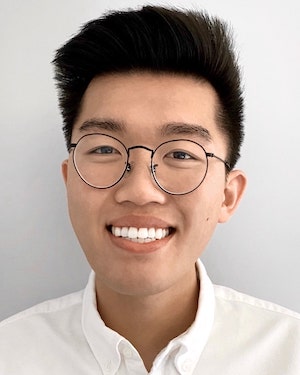
Hot Off The Press!!! ⟩
April 19, 2021, by Calvin
Classes Externships Getting Involved What are OS/OT?
Extra! Extra! Read all about it! Here at USC Chan, we actually have our very own magazine! The USC Chan Magazine is the division’s premier publication and releases twice yearly. The Fall 2020/Winter 2021 issue was recently published, and I had the pleasure of contributing to it as a writer and interviewer. Major thank you to the man behind the magazine, Dr. Mike McNulty, for his guidance, support, creativity and flexibility throughout the entire process, as well as for being such a driving force in making these magazines come to life! So much work gets put into crafting each issue and his collaborative efforts to piece everything together with all contributors is 👏!
Check out the most recent USC Chan Magazine: Fall 2020/Winter 2021 issue!
Here are links to some articles included in the latest issue:
- The Longest Year, by Dr. Carnie Lewis
Reflections on the frontline pandemic experience from a hospital-based occupational therapist. - Lessons Learned, by Calvin Lee (me!)
A new course helps make sense of the pandemic by studying it. - Pain and Pleasure, by Jamie Wetherbe
Face to face and through the screen, a USC occupational therapist helps a client better manage her everyday pain to improve quality of life. - To Do Unto Others, by Dominique Como
Narrowing oral health disparities gaps of Black/African American children with and without disabilities.
I’m also very grateful to have been able to tailor this experience towards my OT 540: Leadership Capstone Externship Project. The externship is an experience where students are provided with the opportunity to build leadership skills and explore an area that is of interest to them. I’ve always been fascinated with the USC Chan Magazine and I was very interested in learning about how an OT lens can contribute to the realm of copywriting and advertisement. I highly recommend giving the magazines a read 😊! Reflecting back, it’s amazing to see how much we’ve accomplished and overcome together as a USC Chan community.
Explore previous issues of the USC Chan Magazine!
⋯
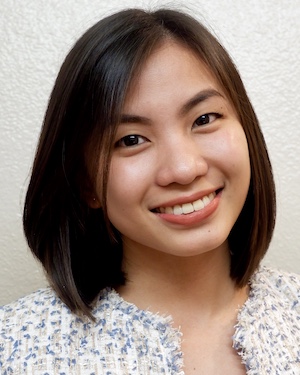
Dear MA1 Students, ⟩
February 25, 2021, by Yna
Classes Diversity Getting Involved International Life Hacks
How we were able to create an environment filled with nothing but love and support for each other with the challenges of distant learning is something that I don’t know but I sure am thankful of. It is truly amazing to think about it: how a lot of us haven’t even met each other in person — with some of us even having classes from across the globe — and yet, we are able to touch each other’s lives and share this journey together through shared Spotify playlists, after-class study sessions over Zoom, little fun facts about us that we share with each other, random comments over private chat, or even that simple “we got this, guys!” really goes a long way. Every once in a while, we find pleasant surprises from our little interactions with each other that gradually connect us altogether and make our experience nothing short of amazing. Today, here’s a surprise that would hopefully help you get through stressful times 😊
- “Dear MA1 Students — I was asked to provide some words of motivation for you, but I would like to THANK YOU for motivating and inspiring me! I’m so impressed by the perseverance, creativity, and determination that you have demonstrated as post-professional master’s students. You have accomplished so much already, and I’m confident you will continue to succeed both in the master’s program and beyond. Remember to take some time to celebrate your achievements and use that as motivation to continue the hard work on your journey.”
— Dr. Emily Ochi - “When I was a graduate student, I found this quote that spoke to me and where I was at, at that time . . . in the midst of late-night study sessions, in-between messy relationships, or wrestling with self-doubt. The quote said:
“Today my anthro professor said something kind of beautiful:
‘You all have a little bit of ‘I want to save the world’ in you, that’s why you’re here, in college. I want you to know that it’s okay if you only save one person, and it’s okay if that person is you.’” I share this quote to give you permission (if you needed it today) to remember to take care of yourself at this time. Of course, we have big dreams for you and I deeply believe in this cohort. Each one of you are incredibly hard workers and I always appreciate the perspectives you bring to class, the work you put into being present (on a screen none-the-less!), and the ways you share your understandings of the class content . . . But! I will not encourage you to compromise yourself, in order to “save the world”. Let’s get rid of that notion. You matter, and let’s start there. So please take time for yourself, especially in the middle of the semester like we find ourselves in now, and let us know if or when you need support or just extra kindness that day. You are doing an extraordinary thing, having the bravery to study in a new place and challenging yourself with multiple courses. That is more than enough, and I hope this message finds you on a day where you are believing that you are more than enough too. “Again, we believe in you and are behind you today!”
— Dr. Kelcie Kadowaki - “HI MA1! I know graduate school can be overwhelming but remember, you know more than you think you know and you are exactly where you are supposed to be at this moment in time. Give yourselves a pat on the back for all the hard work you are putting into your growth. Enjoy the process. Lean on each other for support. Be confident. Take a break and of course, stay safe. 😊”
— Macy Peralta - “Dear MA 1 students — It has been such an honor to be your instructor this semester. I look forward to our class because I can sense your intrinsic interest in the material and the ways that you support one another. I love hearing your perspectives as we read qualitative research together! Karin Saric, our librarian, was also very impressed by your thoughtful questions and skillful database searching.
I have been deeply impressed with your resilience, your ability to not only adapt to the remote learning environment but also thrive in this environment. When you had challenges with google drive, you viewed it as an opportunity to learn and grow. 😊 I love that. I hope I can embody this same resilience and adaptability in my own life as well. Thank you for being a part of this class as we learn and grow together.”
— Dr. Tessa Milman - “Do not underestimate a deep breath of fresh air from a place of serenity like from under your favorite tree or feeling the sense of comfort from having a warm bowl of your favorite soup. These kinds of simple activities, when feeling under a lot pressure can allow space for our minds to take a break and maybe even a chance to reinstate a positive attitude. Remember, sí se puede and that your Chan faculty believe in you!”
— Dr. Celso Delgado - “Life often gets overwhelming with so many things to do and so many situations out of our control - especially this year! When I get overwhelmed, I sometimes find it helpful to pause, take some deep breaths, and think about a few things I am grateful for and try to think of a things that I can control, even if it’s something as small as what to eat for dinner or watch on Netflix. And then, when I feel overwhelmed again, even if it’s just 5 minutes later, I try not to just acknowledge that sometimes, situations really are overwhelming! (And, around this time in spring semester is usually one of those times, pandemic or not!). As your professors, we want you to know that we are so proud of each one of you for taking the big step of being in this program, engaging and showing up for your classes, and doing your best during this hard time so that you can ultimate be the best OTs and help others as much as possible. We hope you take time to take care of yourselves, and hang in there — it will get better. 😊”
— Dr. Sook-Lei Liew - “Sometimes, it helps to remember that in the end, we write our own stories. We can be crushed by some unfairness or a failure, or consider these to be the building blocks for future success, as opportunities to overcome, grow, and inspire others. And if it is our reactions to our circumstances that define us, then any circumstance met with optimism, gratitude, and humility becomes a success story. We are living through a time when our lives and occupations are especially disrupted. Maybe this trial by fire could be what forges you into a uniquely exceptional generation of OTs, and one that is looked up to well into the future!”
— Dr. Christopher Laine - “I have not failed. I’ve just found 10,000 ways that won’t work.” — Thomas Edison; “The expert in anything was once a beginner.” — Helen Hayes; “You don’t always get what you wish for, you get what you work for.” — Anonymous; “Some people dream of great accomplishments, while others stay awake and do them.” — Anonymous
— Dr. Sharon Cermak - “You’ve all worked so hard to get to this point! Think of all the steps you took to get to this program, including for some of you moving to a whole new country! Keep up the great work and when the road ahead looks difficult, don’t forget to look back and marvel at the road traveled to get here!”
— Ty Kim
While these quotes are directed to MA1 students, I’m sure anyone who find themselves in need of a little bit of motivation could use these too. I hope you enjoyed, and as always, Fight On!
⋯






